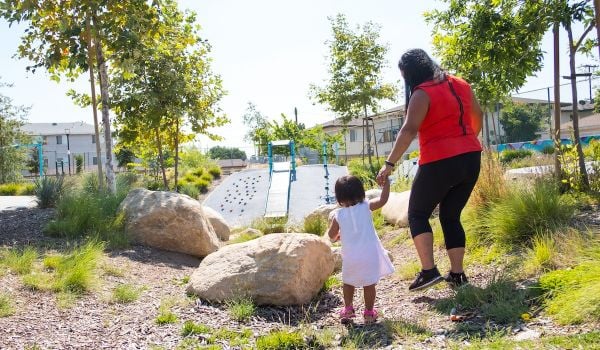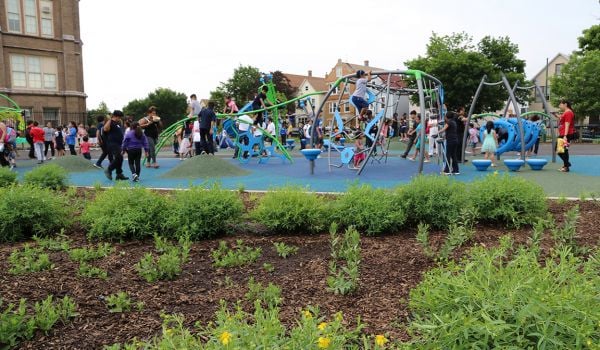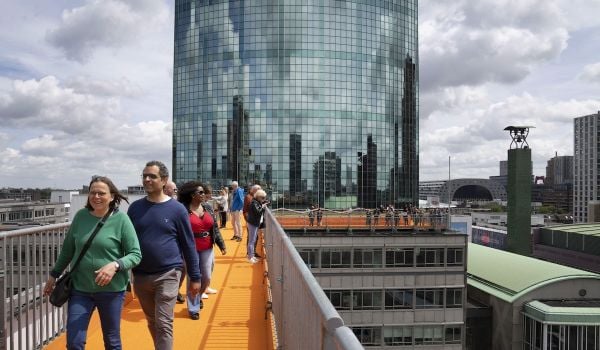Mount Washington rises a steep 390 feet from the Ohio and Monongahela river banks, overlooking downtown Pittsburgh. It’s as much a defining feature of the western Pennsylvania city as its three rivers (the Allegheny and Monongahela join to form the Ohio). The mountain is really what made the city: The mines that once covered it provided the necessary coal for forging steel.
The steel mills nearly vanquished and their smog long gone, the mountain remains a key economic asset. Despite some lingering scars from its coal mining days, Mount Washington attracts around 1.5 million annual visitors, riding the famous “inclines,” special cable cars on steep tracks that take people up and down the mountain, to catch grand views of the Pittsburgh cityscape.
“Mount Washington is a microcosm of the story of Pittsburgh,” says Ilyssa Manspeizer, executive director of the brand-new Pittsburgh Conservation Corps (PCC). The organization plans to forge a route back into the workforce for people who have been unemployed for one reason or another, by hiring and training them to improve public land throughout the region.
Manspeizer spun off PCC from the Mount Washington Community Development Corporation (MWCDC), where she was formerly executive director. She got the idea back in 2010, when MWCDC was in the middle of engaging community members and stakeholders to restore, improve and connect the three parks on top of the mountain (Grand View, Olympia and Mount Washington).
At the same time, Manspeizer was participating in Leadership Pittsburgh, a 10-month capacity-building program for high-level leaders. The program took the cohort on a visit to Allegheny County Jail, located next to the Monongahela riverbank, near downtown Pittsburgh. With Mount Washington looming across the river, visible through many of the jail cells, Manspeizer had a moment.
“Seeing the humanity, the skills, the talent that was really just sitting there and going to waste, it made me think about giving opportunities to them that might not have been given before to become contributing members of society,” Manspeizer recalls.
She went back and began building a program to hire and train people who have had trouble finding or keeping jobs, such as the formerly incarcerated or veterans, to build or connect the 19 miles of trails that the community had just planned. Manspeizer, a PhD anthropologist by background, had never put together a professional construction crew before.
“In some ways it was all new. Partners were invaluable,” she recalls.
For the first three years of what became known as the Emerald Trail Corps, every cohort went through the six-week Breaking the Chains of Poverty Program, run by the Pittsburgh chapter of the A. Philip Randolph Institute. That program focuses on soft skills such as conflict resolution, time management and interview techniques. There is also some technical skills training, focused on green jobs.
MWCDC also hired a part-time crew leader, who later became their full-time program manager for Emerald Trail Corps. Over the course of five “seasons,” MWCDC hired crew members on average for about 20-week contracts, at a starting wage of $10 an hour. (Up until this past year, citing clerical reasons for the change, MWCDC also subsidized 75 percent of the cost of a health insurance plan for the crew members.)
“We definitely wanted to pay them more than minimum wage, but we recognized it’s not quite a family-sustaining wage,” says Kathryn Hunninen, interim co-executive director at MWCDC.
Neither Pittsburgh nor Pennsylvania has a minimum wage law, so there’s only the federal minimum wage of $7.25 an hour. A living wage in Pittsburgh for one adult is generally pinpointed at $9.95 an hour; for one adult with two children it’s $26.15 an hour. Pittsburgh Mayor Bill Peduto recently issued an executive order to raise all city government workers to at least $15 an hour by 2021.
As part of Emerald Trail Corps, MWCDC also hired a part-time “employment specialist,” to build out a program to support crew members to find permanent work. That included working with crew members one-on-one and in groups to provide additional training, resume development, mock interviews, workshops on professionalism and financial literacy, and job-shadowing opportunities.
Over the course of five years, 44 crew members came through Emerald Trail Corps, 75 percent of them transitioning to other full-time employment, part-time employment or higher education within three months after completing the program. Some even left the program after finding permanent jobs before the end of their contracts.
Pittsburgh Conservation Corps is taking that model — and investing more into it. They’ll be hiring a case manager to do the professional development side full-time, and they’ll pursue projects beyond the Mount Washington area.
Before deciding to launch, Manspeizer, representatives from Emerald Trail Corps partners and even some Pittsburgh city officials went on a tour of conservation corps in Oakland, San Francisco, Seattle and Detroit, which largely focus on engaging youth or young adults in improving public spaces. Seattle’s program is run by the city parks department. They decided a new, independent organization made the most sense, as it would allow more flexibility in the types of work and potential clients for the crews that Manspeizer will be building. They’ll start small, with two crews of six each in the first year.
“We want to figure out how to do this safely and responsibly before scaling up further,” Manspeizer explains.
GTECH Strategies, Allegheny Land Trust, the Pittsburgh Parks Conservancy and MWCDC have all committed to contract with PCC to steward or restore public spaces they own or control. Much of Manspeizer’s work this coming year will be focused on building that pipeline of projects and clients. The city itself could eventually be one of them.
“Some of the other cities have had this kind of program for 20-plus years,” says Manspeizer. “The kind of work may have changed somewhat over time, but they’ve managed to find enough work and provide it at a high quality to stay in business.”
The hardest part of the work, according to Manspeizer, has little to do with the work itself. She recalls one conversation with a local company looking to hire exactly the kind of workers she was training with MWCDC.
“They said ‘you know we tried hiring urban people before and it didn’t work out.’ I was floored. I wanted to ask them well what has been their success rate with ‘rural’ people,” Manspeizer says. “There are always going to be individuals we hire who are not ready, who won’t be a success story. But the vast majority I’ve worked with have all worked hard, showed a passion for hard work. I just hope that there are employers out there who are willing to take that chance.”
The Equity Factor is made possible with the support of the Surdna Foundation.

Oscar is Next City's senior economic justice correspondent. He previously served as Next City’s editor from 2018-2019, and was a Next City Equitable Cities Fellow from 2015-2016. Since 2011, Oscar has covered community development finance, community banking, impact investing, economic development, housing and more for media outlets such as Shelterforce, B Magazine, Impact Alpha and Fast Company.
Follow Oscar .(JavaScript must be enabled to view this email address)


_920_573_80.jpg)














